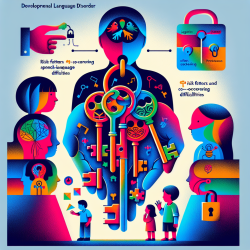Introduction
Developmental Language Disorder (DLD) is a prevalent yet under-researched condition that significantly impacts children's ability to communicate and succeed academically. A recent study titled "Prevalence, co-occurring difficulties, and risk factors of developmental language disorder: first evidence for Mandarin-speaking children in a population-based study" sheds light on this condition among Mandarin-speaking children. This blog aims to help practitioners enhance their skills by implementing the research outcomes and encouraging further exploration in this field.
Key Findings
The study, conducted in Shanghai, China, provides the first evidence of DLD prevalence among Mandarin-speaking children aged 5-6 years. The research reveals a prevalence rate of 8.5%, which is comparable to Western countries. Importantly, children with DLD exhibit higher rates of co-occurring difficulties, including socio-emotional behavior (SEB) issues, low non-verbal IQ (NVIQ), and poor school readiness.
Co-occurring Difficulties
Children with DLD are more likely to experience SEB difficulties, with 37.8% of them being at risk compared to 17.3% of typically developing (TD) children. Additionally, they have a higher likelihood of low NVIQ and poor school readiness. These findings underscore the need for comprehensive assessments that include language evaluation for children struggling academically or socially.
Risk Factors
The study identifies several risk factors associated with DLD, emphasizing the importance of the home and educational environment. Key risk factors include:
- Lack of diverse parent-child interaction: Children benefit more from a variety of activities rather than the frequency of interactions.
- Lower kindergarten level: A comprehensive set of indicators, including teaching quality and facility standards, correlates with higher DLD risks.
These findings suggest that interventions should focus on enhancing the quality of interactions at home and improving educational settings.
Implications for Practitioners
Practitioners can leverage these insights to improve outcomes for children with DLD. Here are some actionable steps:
- Conduct comprehensive assessments that include language evaluations for children with academic or social difficulties.
- Encourage diverse parent-child interactions and provide resources or workshops for parents to enhance engagement.
- Collaborate with educators to improve the quality of early childhood education environments.
By focusing on these areas, practitioners can contribute to better identification, management, and intervention pathways for children with DLD.
Conclusion
The study highlights the significant prevalence and co-occurring difficulties of DLD among Mandarin-speaking children. It emphasizes the role of the home and educational environment in mitigating risks. Practitioners are encouraged to apply these findings in their practice and pursue further research to enhance evidence-based interventions for DLD.
To read the original research paper, please follow this link: Prevalence, co-occurring difficulties, and risk factors of developmental language disorder: first evidence for Mandarin-speaking children in a population-based study.










